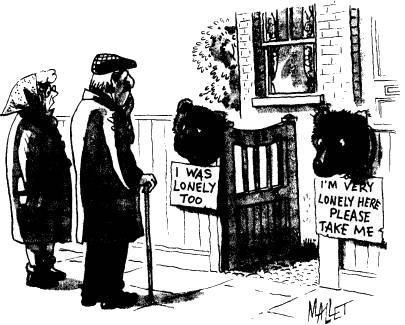 Whitebridge was a srnall village, and old people often came and lived there. Sorne of thern had a lot of old furniture, and they often did not want sorne of it, because they were in a smaller house now, so every Saturday rnorning they put it out, and other people came and looked at it, and sornetirnes they took it away because they wanted it.
Whitebridge was a srnall village, and old people often came and lived there. Sorne of thern had a lot of old furniture, and they often did not want sorne of it, because they were in a smaller house now, so every Saturday rnorning they put it out, and other people came and looked at it, and sornetirnes they took it away because they wanted it.Every Saturday, Mr and Mrs Morton put a very ugly old bear's head out at the side of their gate, but nobody wanted it. Then last Saturday, they wrote, Tm very lonely here. Please take me,' on a piece of paper and put it near the bear's head.
They went to the town, and came home in the evening. There were now two bears' heads in front of their house, and there was another piece of paper. It said, '1 was lonely too.'
A) Which of these sentences are true (T) and which are false (F)? Write T or F.
1. White bridge was a big village.
2. A lot of old people lived in Whitebridge.
3. They put out their furniture every Sunday.
4. The bear's head was very ugly.
5. Nobody wanted the bear's head.
6. There were now three bears' heads.
B) Answer these questions.
1. Why did old people in Whitebridge often sell their old furniture?
2. Where did they put it?
3. What did Mr and Mrs Morton put out every Saturday?
4. What did they write on a piece of paper?
5. Where did they put the paper?
6. What did they find at the side of their gate when they came home in the evening?
7. What was near the bears' heads?
8. What did the pie ce of paper say?
C) Opposites. Put one word in each empty place.
1. Whitebridge was not . . .: it was a small village.
2. ..., people did not often come and live there: old people did.
3. They did not sell their . . . furniture: they sold their old furniture.
4. They did not live in. . . houses now: they lived in small ones.
5. The bear's head was not. . .: it was very ugly.
6. Mr and Mrs Morton did not come home in the. . .: they came home in the evening.
7. The two bears' heads were not . . . Mr and Mrs Morton's house: they were in front of it.
8. They did not see . . . piece of paper: they saw two.

